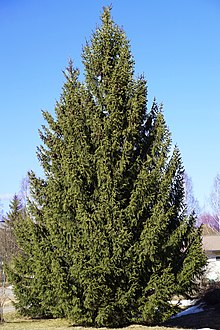egle
Ingrian
[edit]| Previous: | ennen egle |
|---|---|
| Next: | tänäpään |
Alternative forms
[edit]Etymology
[edit]From Proto-Finnic *eklen. Cognates include Finnish eilen and Estonian eile.
Pronunciation
[edit]- (Ala-Laukaa) IPA(key): /ˈeɡle/, [ˈe̞ɡlʲ]
- (Soikkola) IPA(key): /ˈeɡle/, [ˈe̞ɡ̊le̞]
- Rhymes: -eɡl, -eɡle
- Hyphenation: eg‧le
Adverb
[edit]egle
- yesterday
- 1936, V. I. Junus, Iƶoran Keelen Grammatikka[1], Leningrad: Riikin Ucebno-pedagogiceskoi Izdateljstva, page 29:
- Egle oli hyvä ilma.
- Yesterday the weather was good.
Derived terms
[edit]References
[edit]- Ruben E. Nirvi (1971) Inkeroismurteiden Sanakirja, Helsinki: Suomalais-Ugrilainen Seura, page 28
- Olga I. Konkova, Nikita A. Dyachkov (2014) Inkeroin Keel: Пособие по Ижорскому Языку[2], →ISBN, page 58
Latgalian
[edit]
Etymology
[edit]From Proto-Balto-Slavic *edlis. Cognates include Latvian egle and Lithuanian eglė.
Pronunciation
[edit]Noun
[edit]egle f (diminutive egleite)
Declension
[edit]| singular | plural | |
|---|---|---|
| nominative | egle | eglis, egles1) |
| genitive | eglis, egles1) | egļu |
| dative | eglei | eglem, egļom1) |
| accusative | egli | eglis, egles1) |
| instrumental | egli | eglem, egļom1) |
| locative | eglē, eglī1) | eglēs, egļuos1) |
| vocative | egle, egļ | eglis, egles1) |
1) dialectal
References
[edit]- Nicole Nau (2011) A short grammar of Latgalian, München: LINCOM GmbH, →ISBN, page 23
Latvian
[edit]Etymology
[edit]From Proto-Balto-Slavic *edlis, considered by Pokorny to be from Proto-Indo-European *h₁edʰ- (“sharp, pointy”);[1] however, this is rejected by Genaust.[2] It could instead be a borrowing from a European substrate.[3] Cognate with Lithuanian ẽglė, Old Prussian addle, Proto-Slavic *edlь.
Pronunciation
[edit]Audio: (file)
Noun
[edit]egle f (5th declension)
Declension
[edit]| singular | plural | |
|---|---|---|
| nominative | egle | egles |
| genitive | egles | egļu |
| dative | eglei | eglēm |
| accusative | egli | egles |
| instrumental | egli | eglēm |
| locative | eglē | eglēs |
| vocative | egle | egles |
Derived terms
[edit]References
[edit]- ^ Pokorny, Julius (1959) “*edh-lo-”, in Indogermanisches etymologisches Wörterbuch [Indo-European Etymological Dictionary] (in German), volume 1, Bern, München: Francke Verlag, page 289
- ^ Genaust, Helmut (1996) “ébulus”, in Etymologisches Wörterbuch der botanischen Pflanzennamen (in German), 3rd edition, Basel: Birkhäuser Verlag, →ISBN, pages 220b–221a
- ^ Oettinger, Norbert (2003) “Neuerungen in Lexikon und Wortbildung des Nordwest-Indogermanischen”, in Alfred Bammesberger & Theo Vennemann, editors, Languages in Prehistoric Europe, Heidelberg: Winter, →ISBN, page 189
Middle English
[edit]Alternative forms
[edit]Etymology
[edit]Borrowed from Anglo-Norman egle, from Old French aigle, from Latin aquila. Displaced native ern.
Pronunciation
[edit]Noun
[edit]egle (plural egles)
Descendants
[edit]References
[edit]- “ēgle, n.”, in MED Online, Ann Arbor, Mich.: University of Michigan, 2007.
Old English
[edit]Etymology
[edit]From Proto-Germanic *agluz (“cumbersome, tedious, tiresome”), from Proto-Indo-European *h₂egʰlo-, *h₂egʰ- (“repulsive, offensive, hateful”).
Pronunciation
[edit]Adjective
[edit]eġle
Declension
[edit]| Singular | Masculine | Feminine | Neuter |
|---|---|---|---|
| Nominative | eġle | eġlu, eġlo | eġle |
| Accusative | eġelne | eġle | eġle |
| Genitive | eġles | eġelre | eġles |
| Dative | eġlum | eġelre | eġlum |
| Instrumental | eġle | eġelre | eġle |
| Plural | Masculine | Feminine | Neuter |
| Nominative | eġle | eġla, eġle | eġlu, eġlo |
| Accusative | eġle | eġla, eġle | eġlu, eġlo |
| Genitive | eġelra | eġelra | eġelra |
| Dative | eġlum | eġlum | eġlum |
| Instrumental | eġlum | eġlum | eġlum |
Related terms
[edit]Descendants
[edit]Old French
[edit]Etymology
[edit]From Latin aquila, with a change of gender from feminine to masculine.
Noun
[edit]egle oblique singular, m (oblique plural egles, nominative singular egles, nominative plural egle)
Descendants
[edit]Votic
[edit]Etymology
[edit]From Proto-Finnic *eklen.
Pronunciation
[edit]Adverb
[edit]egle
- Ingrian terms inherited from Proto-Finnic
- Ingrian terms derived from Proto-Finnic
- Ingrian terms with IPA pronunciation
- Rhymes:Ingrian/eɡl
- Rhymes:Ingrian/eɡl/2 syllables
- Rhymes:Ingrian/eɡle
- Rhymes:Ingrian/eɡle/2 syllables
- Ingrian lemmas
- Ingrian adverbs
- Ingrian terms with quotations
- Latgalian terms inherited from Proto-Balto-Slavic
- Latgalian terms derived from Proto-Balto-Slavic
- Latgalian terms with IPA pronunciation
- Latgalian lemmas
- Latgalian nouns
- Latgalian feminine nouns
- ltg:Conifers
- Latvian terms derived from Proto-Balto-Slavic
- Latvian terms derived from Proto-Indo-European
- Latvian terms derived from substrate languages
- Latvian terms with audio pronunciation
- Latvian lemmas
- Latvian nouns
- Latvian feminine nouns
- Latvian fifth declension nouns
- Latvian noun forms
- lv:Trees
- Middle English terms borrowed from Anglo-Norman
- Middle English terms derived from Anglo-Norman
- Middle English terms derived from Old French
- Middle English terms derived from Latin
- Middle English terms with IPA pronunciation
- Middle English lemmas
- Middle English nouns
- enm:Birds of prey
- Old English terms inherited from Proto-Germanic
- Old English terms derived from Proto-Germanic
- Old English terms inherited from Proto-Indo-European
- Old English terms derived from Proto-Indo-European
- Old English terms with IPA pronunciation
- Old English lemmas
- Old English adjectives
- Old French terms inherited from Latin
- Old French terms derived from Latin
- Old French lemmas
- Old French nouns
- Old French masculine nouns
- fro:Birds
- Votic terms inherited from Proto-Finnic
- Votic terms derived from Proto-Finnic
- Votic terms with IPA pronunciation
- Rhymes:Votic/eɡleː
- Rhymes:Votic/eɡleː/2 syllables
- Votic lemmas
- Votic adverbs
